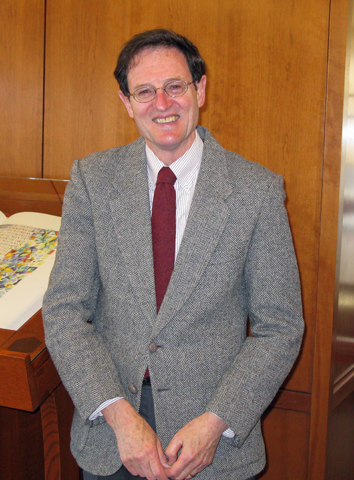
When Patrick Jordan arrived at the Catholic Worker house in New York City in 1968, it was an exhilarating time for the Franciscan seminarian from California.
"It was just after Vatican II. It was the civil rights era -- the Vietnam War and migrant workers. It was a vital and alive place."
On April 24, Jordan spoke at Marquette University's Raynor Memorial Library on the 80th anniversary of the Catholic Worker Movement and its newspaper. After he left the Franciscans in search of poverty, Jordan worked closely with Dorothy Day and lived with the poor at the worker house. As managing editor of the Catholic Worker, Jordan edited Day and an array of other correspondents, including Gordon Zahn and Philip Berrigan. Jordan later left to work with terminally ill cancer patients before becoming managing editor for Commonweal in 1984.
In an interview, Jordan acknowledged that all the ills that spurred the movement still exist.
"In many ways it's gotten worse," he said. "The Catholic Worker Movement is about planting seeds. No time before the end times will the work be completed. But there are now 150 Catholic Worker cells around the country, and many of them did not exist when Dorothy Day was alive."
Jordan lived and worked with the poor at the New York City house in the Bowery that attracted some of the poorest of the poor, including the drug addicts and alcoholics. "The violence was permeable," said Jordan of life in the house, adding that there also was great joy. "Once you live there, it never leaves you."
The goal of the movement to live the Sermon on the Mount and the Beatitudes is being lived in the Catholic Worker houses across the country. For Jordan and his wife, Kathleen, that meant living much of their lives below the poverty line.
The Catholic Worker -- and Day in particular -- rankled with its ardent pacifism and critique of American society.
Fr. Bill Brennan, a Jesuit who attended Jordan's talk, recalled a time when Day was in Milwaukee and the university would not allow her to speak on campus. "She was invited to speak at the high school," said Brennan, 92, a student at the high school at the time.
The Raynor Memorial Library at Marquette now houses a collection of Day's and the Catholic Worker archival materials.
[Marie Rohde is a freelance journalist in Milwaukee.]



